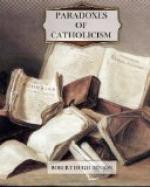We have considered, so far, a number of paradoxical phenomena exhibited in the life of Catholicism and have attempted to find their reconciliation in the fact that the Catholic Church is at once Human and Divine. In her striving, for example, after a Divine and supernatural Peace, of which she alone possesses the secret, she resists even unto blood all human attempts to supplant this by another. As a human society, again, she avails herself freely of human opportunities and aids, of earthly and created beauty, for the setting forth of her message; yet she can survive, as can no human society, when she is deprived of her human rights and her acquired wealth. As human she numbers the great multitude of the world’s sinners among her children, yet as Divine she has produced the saints. As Divine she bases all her gospel on a Revelation which can be apprehended only by Faith, yet as human she employs the keenest and most profound intellects for its analysis and its propagation. In these and in many other similar points it has been attempted to show why she offers now one aspect and now another to human criticism, and how it is that the very charges made against her become, when viewed in the light of her double claim, actual credentials and arguments on behalf of that claim. Finally, in the meditations upon the Seven Words of Christ, we considered very briefly how, in the hours of the deepest humiliation of His Humanity, He revealed again and again the characteristics of His Divinity.
It now remains to consider that point in which she most manifests that double nature of hers and, simultaneously therefore, presents, as in a kind of climax, her identity, under human terms, with Him Who, Himself the Lord of Life, conquered death by submitting to it and, by His Resurrection from the dead, showed Himself the Son of God with power.
I. Death, the world tells us, is the final end of all things, and is the one universal law of which evasion is impossible; and this is true, not of the individual only, but of society, of nations, of civilization, and even, it would seem, ultimately of physical life itself. Every vital energy therefore that we possess can be directed not to the abolition, but only to the postponement of this final full close to which the most ecstatic created harmony must come at last.
Our physicians cannot heal us, they can merely ward off death for a little. Our statesmen cannot establish an eternal federation, they can but help to hold a crumbling society together for a little longer. Our civilization cannot really evolve an immortal superman, it can but render ordinary humanity a little less mortal, temporarily and in outward appearance. Death, then, in the world’s opinion, is the duellist who is bound to win. We may parry, evade, leap aside for a little; we may even advance upon him and seem to threaten his very existence; our energies, in fact, must be concentrated upon this conflict if we are to survive at all. But it is only in seeming, at the best. The moment must come when, driven back to the last barrier, our last defence falters ... and Death has only to wipe his sword.




